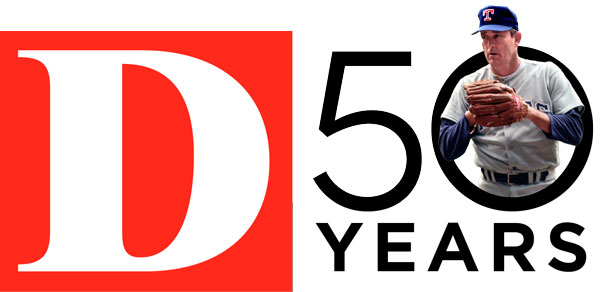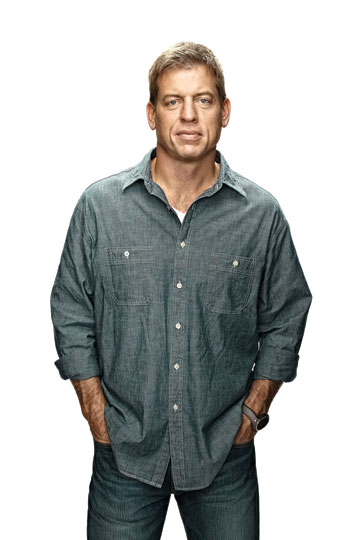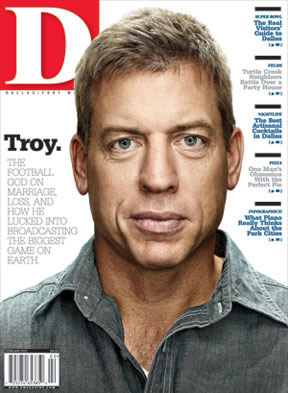It’s two hours before kickoff, and Troy Aikman is standing on the turf at Cowboys Stadium, halfway between the sideline and the famous blue star at midfield. He does this before every game he broadcasts, not just the ones played in places where he’s treated like a demigod.
“Some of the best stuff I get is on the field before the game,” he says. He is in a dark blue suit, and he is a giant, tall and broad-shouldered, with a head like a carnival caricature. “You talk to them on Friday or you talk to them on Saturday, but, you know, you’re able to get more detailed information as to how it relates to that game when you see them on the field.”
At the moment, the person he’s getting more detailed information from is Sean Payton, head coach of the defending Super Bowl champion New Orleans Saints. As players from both teams warm up in shorts and long-sleeved tees around them, Aikman talks to Payton and legendary former Cowboys personnel man Gil Brandt, who now works for NFL.com. Exactly what their conversation is about, I don’t know, because Payton didn’t exactly welcome me into the trust tree when he saw me at Aikman’s elbow, pad and pen in hand. So I’m a few feet away, and that’s when I notice it.
It’s not an accident, because nothing at Cowboys Stadium is an accident, and Jerry Jones has the debt service to prove it. Above the FOX on NFL broadcast booth on the 50-yard line of the visitors’ side, a couple of levels up but perfectly centered, is the 8 TROY AIKMAN 1989-2000 of the team’s Ring of Honor.
The symbolism is a bit heavy-handed, but we’re not in English class here, and, anyway, subtlety has never been Jones’ strong suit. When Aikman comes to Cowboys Stadium—and he does at least a few times every season, in his role as analyst for FOX’s No. 1 NFL announcing team—his past literally hangs over his head. This is where Aikman will be when he calls his third Super Bowl this month, with his longtime partner Joe Buck. Metaphorically, this is where he will be forever.
It’s a blessing and curse, to be immortal. Troy Aikman will always be remembered. But also? He’ll never get to move on.
This means that, no matter where Troy Aikman goes, he is the all-time quarterback. Even when his boss is around.
It’s the Wednesday night before Thanksgiving. FOX’s NFL production crew has taken over a conference room at the Four Seasons in Las Colinas, to prepare for the next day’s Cowboys-Saints broadcast. The scene says cram session—a stack of media guides for both teams stacked haphazardly in the center of the main table, a random assortment of snacks (chips and guacamole, Nutri-Grain bars, a few dozen sodas) on a buffet to the side—but this late in the season, the meeting is little more than a series of motions to go through. If they haven’t figured out how to put on a game by now, after 12 weeks and nine seasons together, another hour or two isn’t going to help much.

Mostly, the production meeting is on the books so everyone, especially Aikman (and Buck, usually, but he’s not here tonight), can get familiar with the video and graphics packages that will be used during the game. Its other purpose is to help coordinating producer Richie Zyontz write the script for the game, figure out the story lines before they emerge, maybe let Aikman try out some of his material. That’s what is happening as we all wait for the rest of the crew to return from Cowboys Stadium. Zyontz and FOX Sports president Eric Shanks sit on one side of the table. Aikman is on the other, along with FOX PR man Dan Bell, sitting on a corner, head bent over his laptop as he types up his notes for tomorrow’s game.
Zyontz runs the crew and, as head of the network’s sports division, Shanks runs Zyontz. But neither one of them is in charge here. Everything happens at Aikman’s pace. He dives in and out of the conversation, involved only when he wants to be. If his gaze shifts to his computer or the video monitor at the head of the table, it’s as though he disappears; no one will directly address him.
It’s okay now. Aikman is looking up from his laptop.
“How do you watch tape, Troy?” Shanks asks. “What do you look for?” It’s almost like I’m feeding Shanks questions.
Aikman says that he starts with the center and guards and works his way out. This is something John Madden taught him when he was starting out as an analyst. “If you think about it, there’s 22 players on the field, and there’s a lot of things you could look at at the snap. As a quarterback, I’ve always looked at the game from the outside in. I’ve always looked at the big picture, the perimeter players, because as a quarterback, that’s what you’ve got to see. Interior players, they tend to look at the inside first and then they kind of broaden.” Right now, he says, he is specifically looking at Dallas’ guards. “They’ve been struggling lately.”
Zyontz takes the opening and pries it apart a bit farther, asking him about previous Thanksgiving games he played in. We are deep inside Aikman’s comfort zone now. He ignores his notes for a few minutes and just tells stories. About Randy Moss’ first game against Dallas in 1998, when the receiver caught three passes, all for long touchdowns. About Jason Garrett’s most famous game with the team, in 1994, when the current Cowboys coach led the team to a record 36 points in the second half, and how it might never have happened if Rodney Peete had been healthy enough to step in at halftime. Aikman is good on the air, but he’s never this good. There is a casual authority that never makes it past his studied insight.
It doesn’t last. When Zyontz asks why Tony Romo never spoke up for Wade Phillips before he was ultimately fired as coach, Aikman is back to being the version of himself that Cowboys fans are familiar with, the good soldier who is open with his opinions only to a point. Aikman’s answer is genuine but it feels rehearsed, just as it will tomorrow when Zyontz speaks into his earpiece and prompts him to relay it to the viewers. Aikman returns to his notes; story time is over.
Throughout the meeting, there is a trace of awkwardness, a formality that is weird for a crew that has been together for so long. It’s not just that Aikman is the only person in the room who is in the Pro Football Hall of Fame (and the College Football Hall of Fame and, as of August 2010, the Oklahoma Sports Hall of Fame). Zyontz (at CBS) and Shanks (at FOX) both broke into the business working for Madden, who is only the most famous NFL analyst ever, and they are both used to being around famous athletes.
Aikman is different. He doesn’t have a presence so much as he embodies an idea of a presence, a sort of engineered personality that feels as though it comes from another set of notes on his laptop. He has a bubble around him that isn’t borne out of celebrity itself but instead an awareness of it, and a protocol governing how to act in the face of it. Just as he did in his playing days, Aikman always has a game plan, a script. Life doesn’t work that way, and so it is awkward. He has been all-caps, boldfaced TROY AIKMAN for so long that he doesn’t seem to have much regular Troy Aikman left. But he still tries.






